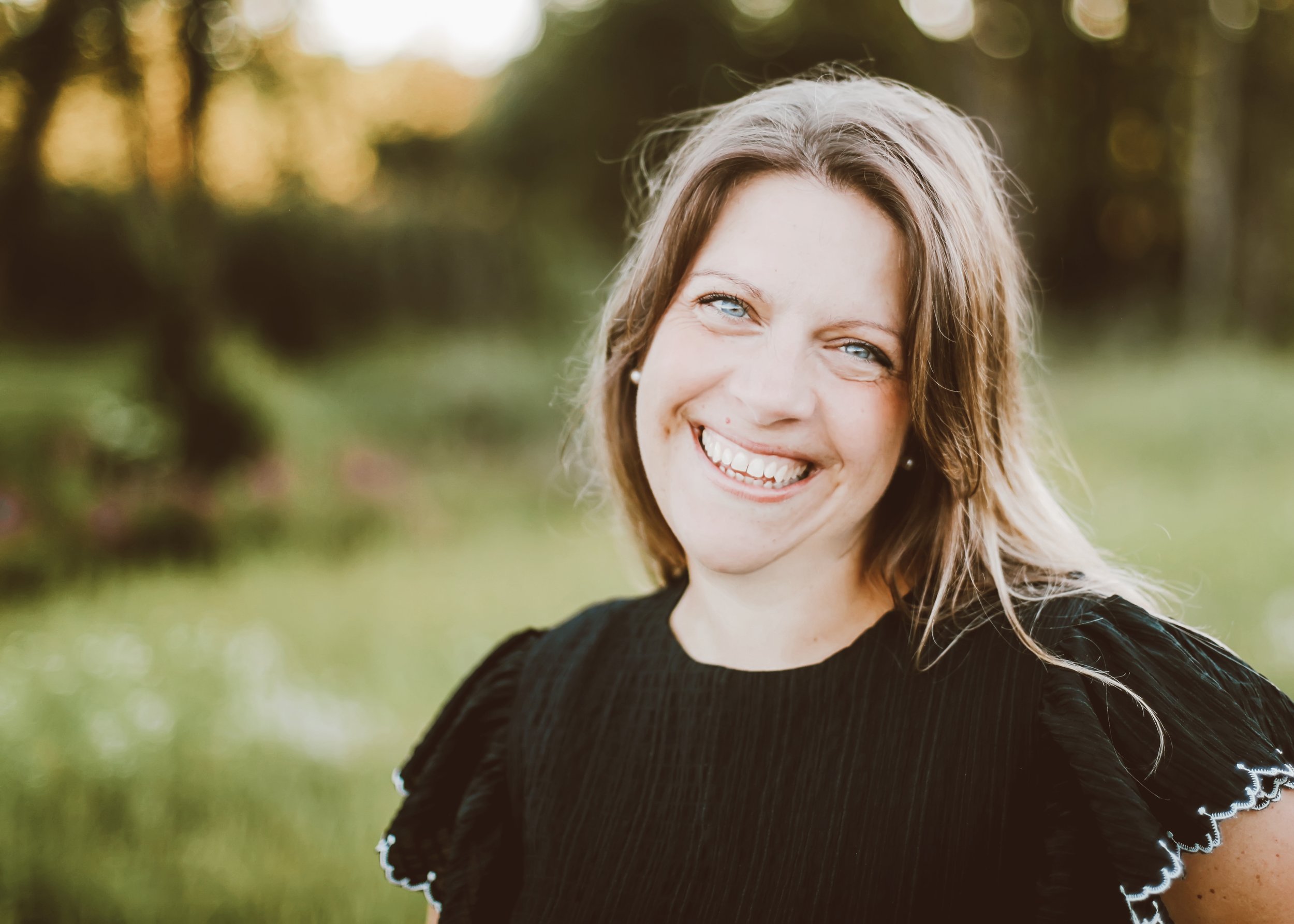Episode 47: Waiting in the In-Between
An interview with Jessica Herberger
Jessica shares her in-process story of waiting in the in-between and finding peace in the dark.
The Seeds
Name: Jessica Herberger
Where do you call home: Albany, NY
Relationship Status: Married
Season of Work: Writer, Seminary Student, Ministry
Hobbies: Reading, Cooking, Embroidery
Jesus Journey: My earliest memory is walking to church through my neighbor’s yard. My personal relationship was a slow relationship to build. A pivotal moment in college of claiming my relationship and then another slow climb to being grabbed by scripture. Relationship first was key. Raised in an incredibly loving and open family which made all the difference. I remember my Mom encouraging me to find my own church as an adult and it was done in such a loving manner-no pressure or judgment. I am so grateful that's been my story the whole way.
The Branches
Jess, if someone were to ask me how I would describe YOU I would use these three words: Gentle, Wise, and Approachable. What three words would you use to describe yourself?
That is so very kind. My three words would be Studious, Loyal, and Creative.
You’ve written three books: Break Bread Together: Finding Friendship at the Last Supper, Life Surrendered: Finding Freedom at the Cross, and your newly released Peace in the Dark: Faithful Practices As We Wait in the Light. What made you want to write about Friendship/Last Supper, Freedom/the Cross, and Darkness/Holy Saturday?
The short answer is God made me do it! I had the idea for a book on how Jesus approached friendship. As my family and I were going through our Last Supper liturgy in 2018 I realized everything we need to know about community plays out on that one night. That is where Break Bread Together came from. It wasn’t until I was done writing BBT in 2019 that I saw the rest of the books. The Good Friday of 2019 was the day my Dad died and I was talking through what the day meant, the idea for Life Surrendered downloaded into my brain as well as the idea for the Sunday book. Saturday was always the mystery. I knew there was a book but I didn't find Peace in the Dark until I started writing it.
We see the thread through your book writing. You have a beautiful way of walking us through historical events, the life of Jesus, and your own life. I know you love history, research, and Jesus…what’s your process for weaving us in and out of story into one cohesive story?
It’s a process that is hard to nail down. I have learned to trust the Spirit within me. I always start with the Scripture and read the relevant sections over and over, sometimes hundreds of times. I ask God to show me what is missed, and He is faithful. I pray through what if anything from my life or my knowledge base can add to the narrative. I think we can get into a lot of trouble, both as writers and readers when we start with ourselves. It’s not about me. I offer what I can if it will help someone but the stories are never about highlighting me. I think the result is something that is relatable to many and that is always the prayer and the hope.
Your latest book is called “Peace in the Dark.” In your acknowledgments, you say this book was an “act of faith that casted light into the dark corners of scripture as well as in your own life.” What do you mean by an “act of faith”?
No one knew what this book was going to be. We weren't even sure what the message was at first. What Is the lesson of this forgotten day? So, to begin writing without any compass was a unique experience. I was challenged as a writer and a theologian and it took a lot of faith to jump in and to keep swimming through. Books are never easy to write but to watch it unfold before you was a really wonderful, terrifying, faithful journey. This book took the most out of me to write and I was writing in a season of a lot of heaviness internally that also required a lot of faith. I showed up empty every time I sat down to write.
I wanted to chat about THIS book in particular because as you know, Olive Us is about women sharing their in-process stories of God’s goodness and faithfulness. Holy Saturday sits between Good Friday and Easter Sunday. But it’s barely talked about in scripture. We have no way of knowing for sure, but why do you think this is so?
I think there are a few reasons. First, the culture at the time was so steeped in Sabbath and burial and lamenting that so much of what happened that day did not need to be said because it was so deeply known and lived. Second, how do you document the in-between? It is such a hard thing to wrap your hands around. It doesn’t make it any less true or any less important. And lastly, part of it is to remain a mystery. This is life. We yearn for the clear-cut answers, the definitive miracles. But that isn’t what the majority of life is. The majority of life is the in-between mystery. Our job is to welcome it.
You go on to say in your book that most of our life is spent in Holy Saturday. Why is it important to be present in “the in-between” and not rush to the resurrected…mountain top…moments in life?
Everyone loves the mountain tops. It is the memory maker, the thing we want to hold on to. But the forming happens during the ascent and descent. If we rush to the top we miss the forming. We also miss the depth of joy we are designed to experience at the mountaintop. This is what happens in a small way during Easter week. We glaze past the brutality of the cross, we discredit the darkness of Saturday and then we celebrate like crazy on Easter. And while we do get to live on this side of the resurrection, it is good for our souls to slow down, to walk with Jesus from the Garden of Gethsemane to the cross at Golgotha-to see every step. There are so many lessons and demonstrations of God’s love and faithfulness that we miss out on when we don’t. Similarly, it is good to sit in the darkness. It helps to remember that God has not forsaken us in our darkness. It helps us to hang on.
The subtitle of your book is “Faithful Practices as We Wait for the Light.” You have 12 chapters that teach us about waiting in the dark. Then your final chapter is titled “ The Light.” I know this is probably super hard to do, but if you were to choose your top three practices to share with Olive Us sisters and listeners everywhere (aka chapters) what would they be?
“Acknowledge Where You Are,” “Welcome Long Suffering,” “The Light.” “Acknowledge Where You Are” because that is the place we must start. What is actually happening? How are you actually doing? “Welcome Long Suffering” because it is such a counter-cultural way to live. It reminds us that suffering is promised, it comes and it comes and it comes. Welcoming it rather than denying it is the key to comfort, peace, and closeness with Jesus. “The Light because the good news is that we have the light within us. There is never really darkness.
Paradox Lake. Phew! You paint a picture so beautiful for the reader of this beloved place that is so special to you personally. Why did you choose Paradox to be the backdrop of your book?
This was a really surprising development within the book! I was out in the kayak for the last paddle of the season, I had brought some books and was researching while I just floated along the lake. I was talking to God, asking what part of me was I supposed to bring to this book. It didn’t feel like there was a clear narrative, but I knew the book was based on the concept of paradox. And then it was instantly so obvious, the lake itself was the backdrop. It was really fun to write about once I realized that was what was being asked of me. The big question was would the lake translate to other readers? It’s been such a delight to hear responses like yours!
What has been ONE gift you’ve received while waiting in dark times in life?
The company of Jesus is the best gift I have received. I am more aware of his presence and love for me during those dark times. Also, every good part of me, the things I like the best, have all been formed in the Saturdays of my life. I am grateful.
Speak to the Olive Us sister who is in a dark season in her life and having trouble finding (or even believing) peace is possible in the dark. How would you encourage her?
God is more present now than you have dared to believe. These dark seasons are hard, so hard, but there is still goodness to be found in them because God is that good. Be brave enough to be honest about where you are, believe God is working for your good even when you can’t see it, and find comfort in looking for the light. Your sadness, your lament, and your grief do not cause distance from God, don’t resist those emotions and instead believe that Jesus himself will meet you right there amid your darkness.
What’s your hope and prayer for readers of “Peace in the Dark?”
I pray they find comfort and a moment of exhale. I pray they recognize there IS peace to be found. I pray they see the darkness, their darkness, whether it be from a major trauma or a minor disappointment, matters to God. They matter to God so much that in the middle of the most important days in history, there was a day of darkness to show us the way through and where to find the light.
Olive Us was created for women to share their in-process stories and be reminded they’re connected through Christ and not alone. Why is this important?
We love a good ending but so often forget the faithfulness required in the middle of our stories. To have a place where women can connect and be encouraged as they are in-process is so essential.
The Olive Tree
Finish these statements:
God is…faithful.
Peace in the Dark is…possible.
‘Olive Us’ are better when…we show up for each other.
Olives to Go
Purchase: “Peace in the Dark” by Jessica Herberger
Available: Lent read-through of “Peace In The Dark" for anyone who has ordered the book. This includes the “Waiting For The Light” Lent companion guide; a private Substack community with daily posts, discussion questions, Live Q&A, and gifts; and a three-month comp subscription to The Table (Jessica’s Substack).

